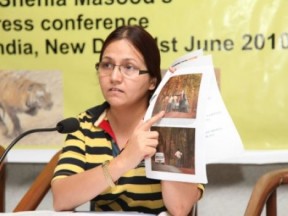It happens with all journalists. You work on a story, watch it slowly build up, wait for an opportune moment, and finally the story never sees the light of day, for whatever reason. I have never cursed myself for stories that have ended up dead, for that was always a frustrating part of the game; but this time I will never be able to excuse myself. For I had wanted to write on the work of a young woman who was brutally shot dead.
Shehla Masood, 38, had been fighting for justice – for a tigress that had been ruthlessly run over by influential people in Madhya Pradesh’s Bandhavgarh National Park last year, and her orphaned cubs. Shehla had been at it for more than a year, and in May when I contacted her for a story about the campaign that would soon be completing a dubious anniversary, she promptly furnished me with the details. But she missed a deadline over some additional information. That’s when I had to hold back the story till the case would draw to its end. Hopefully, in favour of the tigress. Or so I hoped. And I am sure, she did too.
She had been involved in many cases, most of which had to do with wildlife and forests. The most high-profile of these was that of a gruesome wildlife crime.
On May 18, 2010, a group of people illegally entered Bandhavgarh park in jeeps for a ‘night drive’ and happened to hit a tigress, better known now as the Jhurjhura tigress. This mother of three cubs was repeatedly hit by one of the jeeps till she became immobile. It managed to limp off later, but expectedly succumbed to its injuries. One of the cubs too died on August 6, 2010. All this while the forest department had talked of justice for the tigress, and insisted that the cubs were alive and kicking. So, Shehla picked up the cudgels on behalf of the orphaned cubs.
From running signature campaigns to writing letters to Union ministers, her crusade brought out all that is wrong with wildlife and forest conservation in India: untimely deaths of tigers at the hands of humans, dwindling forest cover and exacerbated human-animal conflict, a corrupt-to-the-core forest bureaucracy, an inefficient and lethargic executive, and a callous and impotent media. Undaunted, Shehla stuck to her guns till the end. That’s where the travesty lies.
The Madhya Pradesh forest department was caught in a bind from the onset. For one, the incident had happened in the core area of the park, reputed to be one of the most heavily guarded and protected in the country. And second, the main culprit in question was Umaria District Panchayat Chief Executive Officer Akshay Kumar Singh. Worse, the two IFS officers and two rangers on duty were named either as suspects or complicit in the crime.
The state government did act, but more as a cover-up. Among its first acts were the shutting down of a guest house, called Tiger Heaven, on the outskirts of the park. The lodge was owned by veterinary assistant surgeon Dr KK Pandey, the same man who later conducted a post mortem on the tigress. The report had confirmed internal bleeding caused by an accident.
Half-hearted efforts by the Union Minister of State for Environment and Forests Jairam Ramesh and the National Tiger Conservation Authority (NTCA) had little effect on a recalcitrant Madhya Pradesh government, which kept dragging its heels over the case.
The accused in wildlife crimes in India very rarely convicted, especially if the government of the day through its acts of omission and commission protects the influential. Conviction in the cases of murders of those who fight for wildlife are even rare. We now need to fight for justice – for Shehla.
The ghost of Jhurjhura haunted Shehla through her life, and that of Shehla will haunt me to my death.
Subir Ghosh is a New Delhi-based independent journalist and writer. He has worked with the Press Trust of India (PTI) and The Telegraph, and handled publications/communications for the Centre for Science and Environment (CSE), the Federation of Hotels and Restaurant Associations of India (FHRAI), and the Wildlife Trust of India (WTI). He specialises in Northeast affairs and is an advisory council member with the Centre for Northeast Studies (C-NES). He is the author of ‘Frontier Travails: Northeast – The Politics of a Mess’ published by Macmillan India, and has won two national awards in children’s fiction. His subjects of interest include conflict, ethnicities, wildlife, human rights, poverty, media, and cinema. He blogs at www.write2kill.in where the above story was published first.







Thanks for posting this story. Shelia Masood’s death this week has been overshadowed in part by the protests over corruption and yet its the same corrupt system that led to and is also possibly responsible for her death. Instead of being a poster girl of this revolution her story is being shut down.
Really sad! In a country that does not value human life, I am not sure if I will live to see the day animal life is valued!!